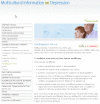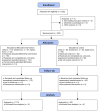Effects of a multilingual information website intervention on the levels of depression literacy and depression-related stigma in Greek-born and Italian-born immigrants living in Australia: a randomized controlled trial
- PMID: 21504872
- PMCID: PMC3221382
- DOI: 10.2196/jmir.1527
Effects of a multilingual information website intervention on the levels of depression literacy and depression-related stigma in Greek-born and Italian-born immigrants living in Australia: a randomized controlled trial
Abstract
Background: Little is known about the efficacy of Internet-based information interventions in increasing depression literacy or reducing depression stigma and depressive symptoms in people from non-English-speaking backgrounds.
Objective: Our objective was to investigate the effects of Multicultural Information on Depression Online (MIDonline), an Internet-based multilingual depression-specific information resource, on depression literacy, depression stigma, and depressive symptoms in Greek-born and Italian-born immigrants to Australia.
Method: In all, 202 Greek- and Italian-born immigrants aged 48 to 88 years were randomly allocated to an online depression information intervention (n =110) or a depression interview control group (n = 92). Participants allocated to the information intervention only had access to the website during the 1- to 1.5-hour intervention session. The primary outcome measures were depression literacy (depression knowledge), personal stigma (personal stigma toward people with a mental illness), perceived stigma (participants' views about the probable attitude of the general community toward people with mental illness), and depressive symptoms. Depression literacy, personal and perceived stigma, and depressive symptoms were assessed at preassessment, postassessment, and at a 1-week follow-up assessment. The trial was undertaken at Monash University, Melbourne, Australia. Randomization and allocation to trial group were carried out using a computer-generated table.
Results: For depression literacy, there was a significant difference between the MIDonline and the control group with those in the MIDonline intervention displaying higher depression literacy scores postassessment (F(1,178) = 144.99, P < .001) and at the follow-up assessment (F(1,178) = 129.13, P < .001) than those in the control group. In addition, those in the MIDonline intervention showed a significantly greater decrease in mean personal stigma scores postassessment (F(1,178) = 38.75, P < .001) and at the follow-up assessment (F(1,176) = 11.08, P = .001) than those in the control group. For perceived stigma, there was no significant difference between the MIDonline intervention and the control group at postassessment (F(1,178) = 0.60, P = .44) and at the follow-up assessment (F(1,176) = 1.06, P = .30). For level of depression, there was no significant difference between the MIDonline intervention and the control group at preassessment (F(1,201) = 0.56, P = .45), postassessment (F(1,178) = 0.03, P = .86), or at the follow-up assessment, (F(1,175) = 1.71, P = .19). Within group effect sizes for depression literacy were -1.78 (MIDonline) and -0.07 (control); for personal stigma, they were 0.83 (MIDonline) and 0.06 (control); for perceived stigma, they were 0.14 (MIDonline) and 0.16 (control); and for depressive symptoms, they were 0.10 (MIDonline) and 0.10 (control).
Conclusions: Current results suggested that the Internet may be a feasible and effective means for increasing depression knowledge and decreasing personal stigma in non-English-speaking immigrant populations residing in English-speaking countries. The lack of change in perceived stigma in this trial is consistent with results in other trials examining online depression stigma interventions in English-speaking groups.
Trial registration: ISRCTN76460837; http://www.controlled-trials.com/ISRCTN76460837 (Archived by WebCite at http://www.webcitation.org/5xjxva4Uq).
Conflict of interest statement
None declared
Figures
References
-
- Goldney RD, Fisher LJ, Wilson DH, Cheok F. Mental health literacy of those with major depression and suicidal ideation: an impediment to help seeking. Suicide Life Threat Behav. 2002;32(4):394–403. - PubMed
-
- Jorm AF, Korten AE, Jacomb PA, Christensen H, Rodgers B, Pollitt P. "Mental health literacy": a survey of the public's ability to recognise mental disorders and their beliefs about the effectiveness of treatment. Med J Aust. 1997 Feb 17;166(4):182–6. http://www.mja.com.au/public/issues/feb17/jorm/jorm.html - PubMed
-
- Jorm AF. Mental health literacy. Public knowledge and beliefs about mental disorders. Br J Psychiatry. 2000 Nov;177:396–401. http://bjp.rcpsych.org/cgi/pmidlookup?view=long&pmid=11059991 - PubMed
-
- Australian Bureau of Statistics. 2007. [2011-04-06]. Census of Population and Housing, 2006 http://www.abs.gov.au/websitedbs/D3310114.nsf/home/Census+data.
Publication types
MeSH terms
LinkOut - more resources
Full Text Sources
Medical





